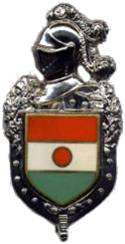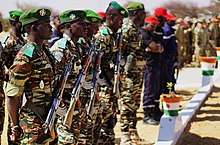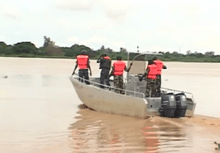Gendarmerie Nationale (Niger)
The Gendarmerie Nationale (Gendarmerie Nationale Nigérienne) is the national paramilitary police force of Niger. One of two paramilitary police units of the nation, the Gendarmerie Nationale is modeled on the Gendarmerie of former colonial power, France. Its purpose is to provide police protection outside of urban areas, patrolled by the National Police (Police Nationale). The Gendarmerie Nationale is a centrally controlled 3,700 member paramilitary police force that provides policing outside those jurisdictions policed by the Police Nationale, usually smaller towns and rural areas.[1][2] It is uniformed, ranked and trained in military fashion.
| National Gendarmerie of Niger | |
|---|---|
 | |
| Active | As Republican Guard: 1962–Present |
| Country | |
| Role | Paramilitary forces of Niger |
| Size | 3,700 |
| Part of | Ministry of Defense |
| Commanders | |
| Current commander | General of Brigade, Issa Mounkaila |
History
Following the creation of the Republic of Niger and in anticipation of its independence, the National Gendarmerie began transferring leadership to Nigerien officers. In August 1962, Lieutenant Badie Garba replaced Captain Maurice Dapremont then Superior Commander of the National Gendarmerie thus becoming the first Nigerien head of the Gendarmerie corp.[3]
When the Police Nationale was moved to the Nigerien Interior Ministry in 2003, the FNIS fell under their jurisdiction, while the Gendarmerie remained under the Nigerien Ministry of Defense.[4]
Structure and Organization

The Gendarmerie Nationale is headquartered in Niamey and has four regional Groupements based in Niamey, Agadez, Maradi, and Zinder.[5] A highway police unit known as the Brigade Routière is also a part of the Gendarmerie Nationale, and they are charged with providing security to the nation's highways however the unit mainly operates checkpoints.[6]
Specialised units
The GN includes police patrol and institutional security units, as well as specialised units, including a Niamey Motorcycle Unit (Peloton de sécurité routière de Niamey) for traffic and VIP escort duty,[7] a Telecommunications section (Division Télécommunication de la Gendarmerie),[8] and a nautical unit (Gendarmerie Fluviale).
Fluvial Brigade

The portion of Niger river in Niger links the northern Mali and Northern Nigeria. In the wake of the unrest in both of these areas with Boko Haram in Nigeria and the conflict in the north of Mali, Niger has moved to ensure adequate patrolling of the Niger river in Niger. The goal of this brigade is to ensure safety of people and resources on the river and to prevent trafficking in any nature that might contribute to the regional conflicts. In 2008, the Fluvial Brigade of the National Gendarmerie was created and equipped with three patrol boats acquired from France. The role of this brigade is to conduct riverine patrols in Niamey, Tillaberi, and Gaya.[9] This brigade works closely with custom services to address fluvial and riverine trafficking on the Niger river. Training and exchanges are carried out with regional partners such as Mali and Senegal as well as France. The latter has also provided logistical support in the form of patrol boats.
School and Training
Training of "Gendarme" is conducted at the National Gendarmarie School (French: "L'école nationale de la Gendarmerie") at Koira Tagui in Niamey as of 2008. Training was previously conducted at the Camp Tondibiah, the military Army Base in Niamey and primary training center for the Army corps. The first graduating class out of the school included a 1000 "gendarmes", of whom 70 were women.[10]
Cultural sponsorships
The Gendarmerie Nationale sponsors a semi-professional football club, Union Sportive de la Gendarmerie Nationale, which plays in the Niger Premier League.
See also
References
- Framework partnership document France - Niger (2006-2010) Archived February 24, 2012, at the Wayback Machine, Ministère des Affaires étrangères (France), 2006. DOSSIER NIGER: Les forces armées nigériennes (FAN), Ministère des Affaires étrangères (France), 2003.
- La Mission de Coopération Militaire et de Défense Archived October 23, 2007, at the Wayback Machine. Embassy of France in Niamey. 2008.
- Book - Armée et politique au Niger. Editor Idrissa Kimba. Publisher African Book Collection. 2008
- Déplacement du Directeur au Niger Archived February 14, 2012, at the Wayback Machine, Ministère des Affaires étrangères (France).
- John Andrade (9 January 2016). World Police & Paramilitary Forces. Palgrave Macmillan UK. pp. 148–. ISBN 978-1-349-07782-3.
- Cecil Kuhne (8 June 2011). Near Death in the Desert. Knopf Doubleday Publishing Group. pp. 56–. ISBN 978-0-307-79371-3.
- Remise de cinq motos à la Gendarmerie Nationale Archived 2011-07-16 at the Wayback Machine. Embassy of France to Niamey (2008)
- Le projet Transmissions Interarmées Archived 2011-07-16 at the Wayback Machine. French Embassy at Niamey (2008)
- Aide français à la gendarmerie fluviale du Niger Archived 2011-07-16 at the Wayback Machine. French Embassy at Niamey (2008).
- Visite du ministre de la Défense Nationale à l'école de la Gendarmerie nationale : encourager les recrues à plus d'abnégation. Habibou Ousmane, Le Sahel. 10 June 2009
- Gendarmerie Nationale du Niger. African Development Information Database. Accessed 2009-06-10.
| Wikimedia Commons has media related to Gendarmerie of Niger. |